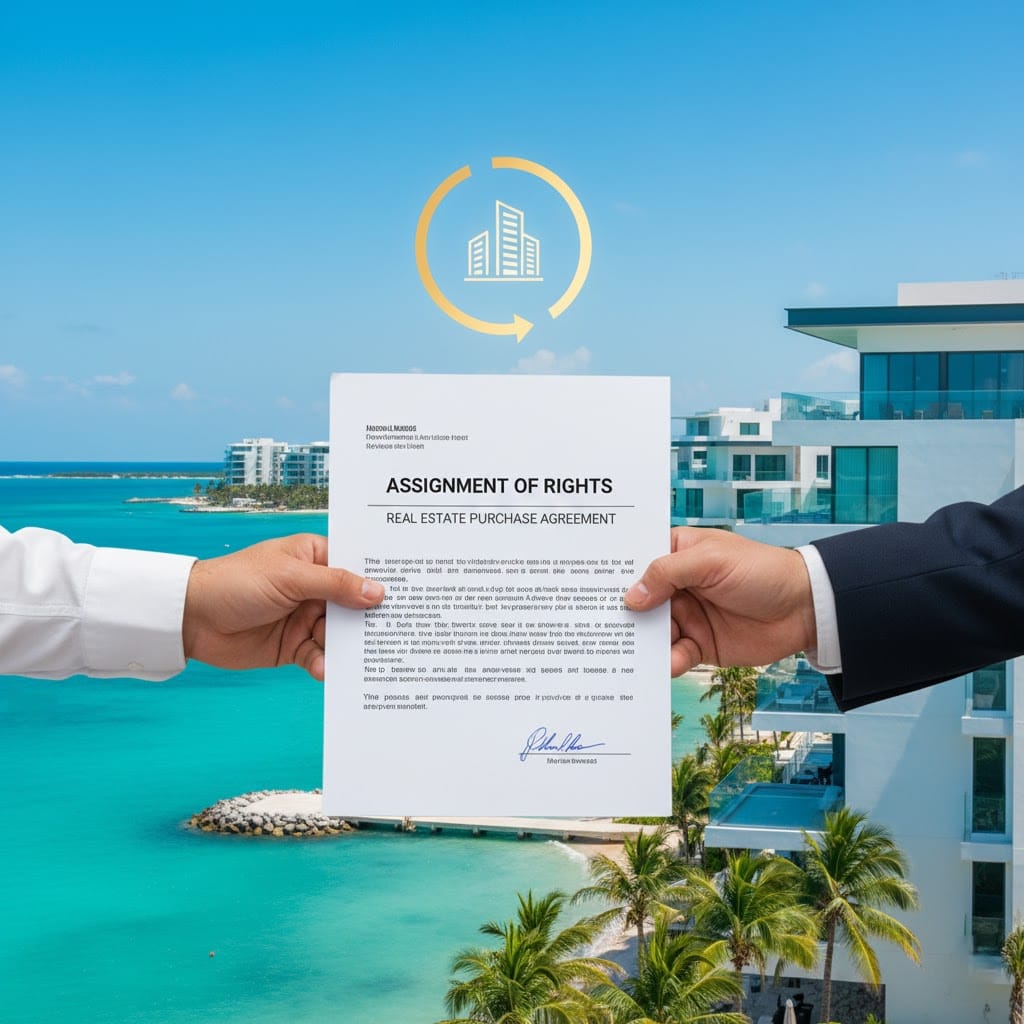Flipping a Pre-Sale Property? The Power of Assignment of Rights in Mexican Real Estate
Discover why securing a “Cesión de Derechos” clause in your contract is a non-negotiable step for protecting your investment flexibility in the Riviera Maya.
Investing in a pre-construction property in the Riviera Maya is exciting. The promise of a brand-new home in paradise, often at an attractive price, is hard to resist. For many foreign buyers, this is also a strategic investment. You might plan to sell the property for a profit before it’s even finished. This process, often called “flipping,” is common. However, your ability to do so depends entirely on a crucial clause in your contract. This clause governs the assignment of rights in Mexican real estate.
Without this provision in writing, your investment flexibility could be at the mercy of the developer. As a result, understanding and securing this right from the very beginning is essential. It protects your options and safeguards your financial strategy.
What is an Assignment of Rights?
In Mexico, the legal term for assigning your rights is Cesión de Derechos. It is the formal process of transferring your position in a purchase contract to a new buyer. This is especially important in pre-construction deals. When you sign a promissory contract (Contrato de Promesa), you do not yet have the final title deed (Escritura Pública). Instead, you own the right to acquire the property once it is completed and paid for.
Therefore, an assignment of rights means you are not selling the physical property. You are selling your contractual rights and obligations to someone else. The new buyer, called the “assignee,” effectively steps into your shoes. They gain the right to receive the finished property from the developer. In return, they also assume your obligation to make any remaining payments. Think of it like selling your golden ticket to a much-anticipated event before the doors open. It is a powerful tool, but it is not an automatic privilege.
The Developer’s Consent is Non-Negotiable
A common mistake foreign investors make is assuming they can freely sell their pre-construction unit. In reality, you almost always need the developer’s explicit permission. The original promissory contract you signed is the key document here. It should clearly state whether an assignment is allowed and under what conditions.
Most developers require their prior written consent for any assignment to be valid. Attempting to assign your rights without this approval could put you in breach of your original contract. Furthermore, developers often charge a fee for processing the assignment, which can range from a small administrative cost to a percentage of the property’s value. These terms must be reviewed carefully before you sign anything. Having a lawyer negotiate these points on your behalf can save you significant trouble and expense later on.
Why Your Assignment Clause Must Be in Writing
Verbal assurances from a sales agent are not enough. If your right to assign is not clearly defined in the promissory contract, you have very little legal standing to demand it later. This is why securing a well-drafted assignment of rights in Mexican real estate clause is a critical part of the initial negotiation.
Putting it in writing provides contractual certainty. It removes ambiguity and ensures all parties understand the terms from day one. For investors, this clause protects your exit strategy. It gives you the legal foundation to adapt to market changes or personal circumstances. In addition, having this clause strengthens your negotiating position. A developer is far more likely to agree to terms during the initial sale when they want to secure your investment. Trying to ask for this flexibility after the contract is signed gives them all the power.
Legal and Financial Hurdles to Consider
Successfully assigning your rights involves more than just finding a new buyer and getting the developer’s approval. You must also navigate important legal and financial requirements. This is another area where professional guidance is essential for a smooth transaction.
First, the transaction is subject to Mexico’s Anti-Money Laundering (AML) law. This means all parties—you, the new buyer, and the developer—must comply with “Know Your Customer” procedures. The new buyer will need to prove the lawful origin of their funds, adding a layer of due diligence to the process.
Second, there are important tax implications. If you sell your rights for more than you originally paid, that profit could be considered taxable income in Mexico. Understanding how this income tax (ISR) is calculated is crucial for determining your true return on investment. An expert can help you navigate these rules to ensure full compliance.
Facing a dispute over assignment of rights in Mexican real estate? Don’t navigate it alone. Contact PeninsuLawyers to protect your investment and secure your property rights.



